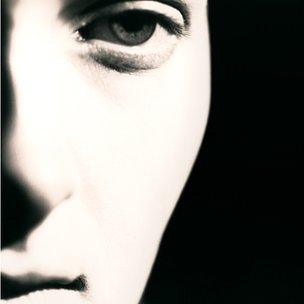Face blindness: Seeing but not seeing
- Published

People with prosopagnosia see a face - but don't recognise it
Imagine that suddenly you cannot recognise your mother, your partner, your child. You can see them but your brain cannot process the information - you don't know whether they are smiling, or understand their emotions.
That is what happened to David Bromley, after he suffered a brain injury that left him with face blindness.
David has prosopagnosia. People with this condition can see the eyes, the nose, and the mouth, what is known as the context - but they cannot see them as a whole. They do not recognise gestures or emotions.
"I can even recognise my wife if I walk into the house and know that she is there," says David.
"But if I'm in the street and she passes by and I don't know that she is going to be there, I wouldn't recognise her."
David, who lives in Essex, had unknowingly been living with eye damage since birth - the arteries and veins were mixed up. This eventually caused a partial loss of sight and damage in the brain which caused the prosopagnosia.
Perhaps the most difficult aspect of this condition is that people do not notice right away that something is wrong with them.
'Social embarrassment'
He remembers when he realised there was a problem.
"I went to a reunion where I saw friends that I hadn't seen for 30 years. We were pretty close but we went our separate ways."
On the way home, he told his brother-in-law: "'Fran and Mickey haven't changed a bit, they are exactly the same!'. And then I said 'hold on, were they wearing tank tops?'"
What David was seeing was his memory of their friends back then. "My brain was telling me that there they were and what they looked like, but that wasn't the reality".
After that, he discovered he was face blind.
There are two main forms of prosopagnosia; developmental - where people fail to develop face processing abilities which is thought to affect around 2% of the population, and acquired, which develops after some form of brain injury and is much rarer.
Dr Ashok Jansari, a cognitive neuropsychology expert from the University of East London said: "Acquired prosopagnosia is extremely rare because the type of brain damage is very specific,.
"It can be caused by damage to the back of the brain on the right-hand side in an area known generally as the right occipito-temporal region."
David said: "I don't know what's worse - not being able to ever recognise people or at 56 years old - as it happened to me - suddenly not being able to recognise anybody".
He added that the worst part is the social embarrassment.
"We were on holiday in Cuba and I'd been snorkelling in the sea. I was talking with this guy from Denmark, when this woman swam up and said 'buenos dias' and I went 'hello, pleased to meet you', thinking it was his wife, but it was actually my wife and I hadn't recognised her."
David can see people perfectly well - but 10 or 15 minutes later he cannot recognise them.
He now tells clients: "If I ignore you, I'm not being rude, it is just that I can't recognise you."
Job fears
Sandra, from London, who only wants to give her first name, is also afraid of social embarrassment.
She had encephalitis - inflammation of the brain - 14 years ago, which left her with face blindness.
Even though her prosopagnosia is mild - she can recognise people she knew before her illness - she would rather not let people know because she does not want anyone to think she has some sort of incapacity.
"Life with prosopagnosia is very shameful," she says.
She is teacher and at work almost nobody knows that she is face blind.
"If I see someone every day, I can recognise them. But if one of the children says hi to me on the street, I would know it is a student from the school, but I wouldn't know who.
"I don't say anything to the children, I just work every day to learn their faces."
But she says: "Perhaps the reason why I don't mention it is because I don't want them to think that I cannot do my job, because that's not true. I don't want to feel ashamed or that people think that there is something wrong with me."
Dr Jansari understands the feelings and fears of David and Sandra.
He knows of cases in which people have lost their jobs because of the condition - including a teacher who had difficulty recognising pupils, causing problems when parents came to pick up their children at the end of the day,
Even though prosopagnosia is not recognised as a disability, Dr Jansari thinks it should be treated as such in some cases.
This condition has no cure. "In the case of acquired prosopagnosia, once a part of the brain is damaged it is not going to 'grow' back, so it is impossible to fix the problem," he said.
"With developmental prosopagnosia, we don't know what causes it, but hypothetically in the future if they find that there is a genetic cause, that could be corrected - but that would be a very long way off."
Even though people develop strategies to cope - because people change their appearance, they are not foolproof.
Dr Jansari says: "Once David thought that a photograph he saw was of George Michael but it was of me, from a time when I used to have a goatee beard and a gold earring!"
- Published13 August 2013